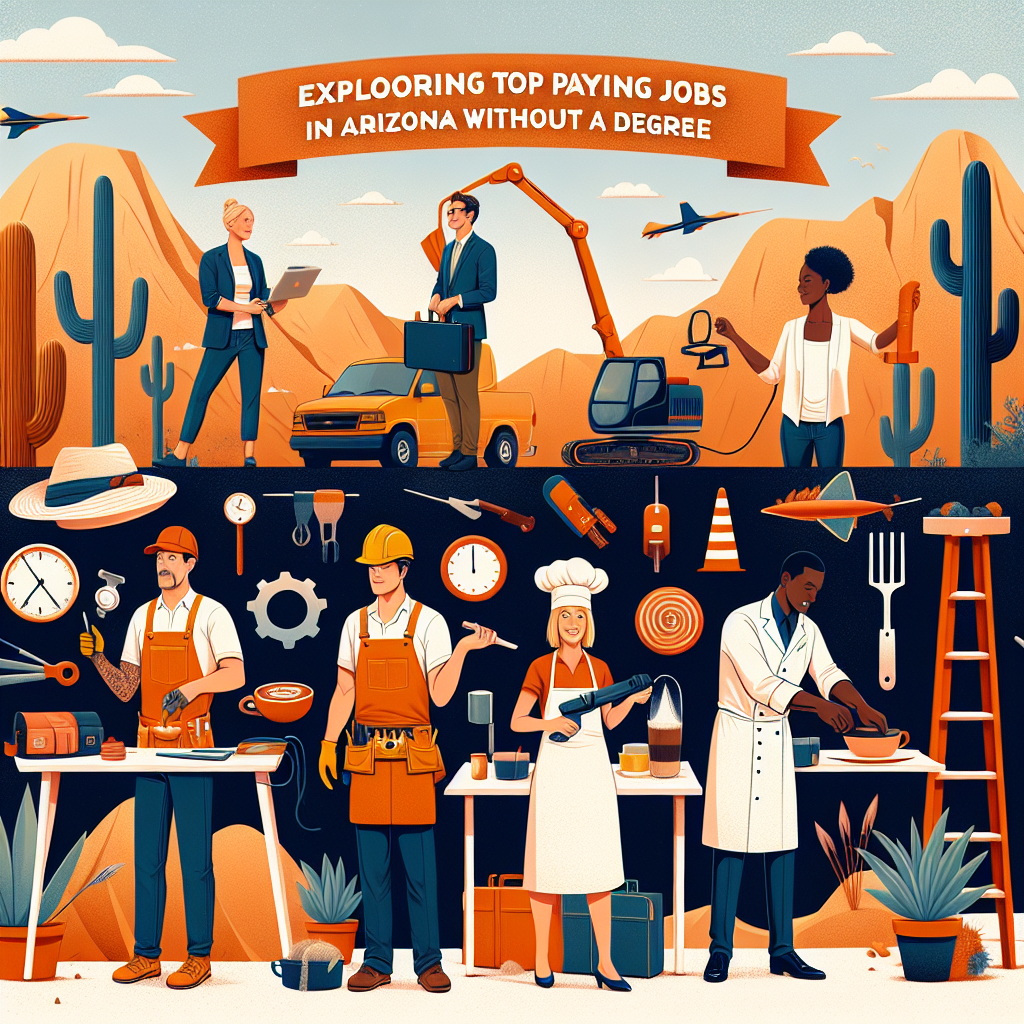Exploring Top Paying Jobs In Arizona Without A Degree: What It Means For You. If you’re weighing career options that don’t require a four-year credential, Arizona offers a variety of well-paid paths that rely on practical skills, licenses, or short-term training. This article outlines realistic routes, industry trends, and concrete steps you can take to upgrade your income and stability without a bachelor’s degree.
Where the opportunity is: high-paying sectors
Across Arizona, several industries consistently hire candidates without a college degree but pay competitive wages. These sectors emphasize experience, certifications, or on-the-job training over formal academic credentials.
- Skilled trades: electricians, plumbers, HVAC technicians—licensed tradespeople are in demand across urban and rural areas.
- Transportation and logistics: commercial driving and warehouse supervision can lead to solid earnings and advancement.
- Technology support roles: entry-level IT technicians and help desk positions often require certifications rather than degrees.
- Construction and solar energy: Arizona’s growth in construction and renewable energy creates openings for installers and supervisors.
- Healthcare support: medical assistants, phlebotomists, and certified nursing assistants provide stable work with short training programs.
Top-paying alternatives without formal degrees
You can reach upper-middling incomes through certification, apprenticeships, or licensure. Examples of roles that commonly pay well in Arizona without requiring a bachelor’s degree include commercial truck drivers, skilled tradespeople, real estate brokers (after passing state exams), and supervisory roles in logistics and manufacturing.
Trucking and transportation
Long-haul and local commercial driving jobs often require only a CDL and some on-road experience, but they can deliver higher-than-average wages and benefits. For industry statistics and occupational details, consult the federal occupational profile for truck drivers, which explains typical duties, licenses, and pay ranges: BLS profile for heavy and tractor-trailer truck drivers.
Skilled trades and apprenticeships
Apprenticeship programs are one of the fastest routes to a well-paid career. Employers often cover training costs and pay apprentices while they learn. Electricians, plumbers, and HVAC technicians typically move from apprentice to journeyman to master—each step brings higher compensation. Community colleges and trade schools in Arizona offer the classroom portion of these programs and connect students with local unions or employers.
How to prepare: practical steps you can take now
Move from intent to income by following a plan that emphasizes credentialing, networking, and employer-aligned skills.
- Research state licenses and required certifications for your chosen field (Arizona licensing boards and trade organizations provide up-to-date requirements).
- Enroll in short-term training or certificate programs at community colleges or technical schools.
- Pursue apprenticeships or on-the-job training to build experience while earning.
- Develop soft skills—communication, punctuality, problem solving—which employers often value as highly as technical know-how.
- Consider remote or hybrid roles when applicable; there are also options for remote work that pay well and require specialized certifications—see advice on remote job strategies here: good paying jobs from home — expert tips and strategies.
Pay vs. cost of living: what to expect in Arizona
While some Arizona metros like Phoenix and Tucson have grown significantly, many non-degree careers still provide earnings that outpace local living costs—especially where overtime, shift differentials, or performance bonuses apply. Salaries vary by experience, employer, and certification level, so aim for roles with clear advancement tracks (e.g., journeyman electrician to shop supervisor).
Advancement without a degree
Promotion paths can include supervisory roles, contractor or small-business ownership, and specialized technical certifications. Investing in stackable credentials—short courses that add to your expertise—often leads to higher pay without returning to full-time college.
Short checklist to get started
- Identify 2–3 target occupations that match your skills and interests.
- Confirm Arizona licensing or certification requirements for those jobs.
- Enroll in an accredited short-term program or apprenticeship.
- Network with local employers, trade schools, and workforce boards.
- Track pay scales and benefits to select roles with advancement potential.
FAQ
Q: Can I earn as much without a degree as with one in Arizona?
A: Some non-degree careers—particularly in skilled trades, commercial driving, and certain technical roles—can match or exceed earnings of degree-holders, especially when you factor in lower education debt and faster entry to the workforce.
Q: How long does it take to reach a good wage in these fields?
A: Many certificate programs and apprenticeships range from a few months to four years (apprenticeships). Several high-paying positions become attainable within 12–24 months of focused training and experience.
Q: Where can I find training or apprenticeship opportunities in Arizona?
A: Start with local community colleges, workforce development boards, trade unions, and employer training programs. They often list openings and can guide you through certification and licensing steps.



